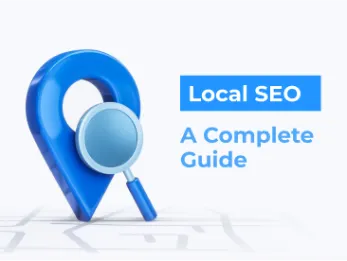How to Do Keyword Research for Any Website - Ecommerce, Blogs & Services (Reviewed in 2025)
10 mins | 24 Jul 2025

If you want to create content that connects with your audience, keywords are key. They help search engines understand what your website is about. By using keywords smartly in your content, you can attract more visitors and get noticed online.
Think of keyword research like a map to success. Just as a map shows the way, good keyword research helps people find your website. By knowing the words and phrases your audience uses when searching online, you can make content that fits their needs.
Why Keywords Matter
Choosing the right keywords makes a big difference in how well your website does. It’s like speaking the same language as your visitors. When you use words they understand, you’re more likely to catch their attention and bring them to your site.
Here’s why keywords are important:
- Better Search Rankings: Search engines rank pages based on how relevant they are to what people search for. Using relevant keywords helps your site show up higher.
- Targeted Visitors: Optimizing for specific keywords brings visitors who are looking for exactly what you offer. These visitors are more likely to become customers.
- Stand Out from Competitors: Keyword research helps you find chances your competitors missed. By focusing on less crowded but related keywords, you can rank better.
1. Know Your Goals and Audience
Before starting keyword research, be clear about what you want and who you want to reach. What’s your goal? Who is your audience?
Answering these questions makes sure your keyword research matches your goals. For example, if you’re a local business wanting nearby customers, focus on location-related keywords.
Remember, the goal of keyword research is to make content that speaks directly to your audience. Understanding their interests and problems lets you create messages that connect with them.
In short, good keyword research helps improve your site’s visibility and brings in more visitors. Knowing why keywords matter and how they affect search results lets you build a plan that works.
Now that we’ve covered the basics of keyword research, let’s look at some useful tips for doing it well on a website.
2. What is keyword research?
Keywords are the words people type into search engines when they want to find information. They are the foundation of SEO, helping your content appear in search results. Keywords are especially important when people search for things related to what you offer. Keyword research helps you understand how these words work in SEO.
To find the best keywords, you need a good understanding of SEO keyword research. Keywords are the base of search engine optimization (SEO). They make your content easy for search engines to find and analyze. For more details, check out our blog - Crafting Connection with Top Formats.
Types of Keywords
There are different kinds of keywords you should know:
- Short-tail keywords: Short and broad keywords that are easy to find.
- Long-tail keywords: More specific and detailed keywords for targeted content.
- LSI keywords: Latent Semantic Indexing keywords that help search engines better understand your content’s context.
By learning about these types, you can do effective keyword research for any website.
Understanding Search Intent
To choose the right SEO keywords, you need to understand what people want when they search. Search intent shows the reason behind a search. It can be informational, navigational, commercial, or transactional.
Knowing this helps you create content that matches what people are looking for. Search intent means why someone types a certain query into a search engine.
It could be:
- Informational: Looking for information on a topic.
- Navigational: Trying to find a specific website or page.
- Commercial: Interested in buying but still researching options.
- Transactional: Ready to make a purchase.
3. Why is Keyword Research Important?
Keyword research is key to making your content easier to find on search engines. By choosing the right keywords for your website, you can boost your chances of showing up at the top of search results. Keywords help people find your content more easily.
Here are some main reasons why keyword research matters:
- Better SEO Visibility: It helps improve your ranking on search engines by finding the best keywords for your content. Implementing some technical SEO tips can further enhance this visibility.
- Attracting the Right Visitors: Picking the right keywords brings the people who are interested in what you offer.
- Increasing Website Traffic: Keyword research helps bring more visitors to your site.
- Boosting Conversion Rates: Using good keywords can lead to more visitors taking action, like buying or signing up.
- Creating Focused Content: Choosing keywords that match your audience lets you write content they’ll find useful and interesting. This aspect is crucial in content marketing, as it allows for tailored messaging that resonates with the target audience.
- Understanding What Users Want: Keyword research shows what people are really looking for when they search.
This approach helps you reach the right audience with your content, making it more effective.
Keyword research also helps you learn what your audience needs and cares about. By understanding why people search certain words, you can create better content that answers their questions.
It lets you discover your audience’s specific interests and problems. Plus, by checking how many people search certain keywords and how tough the competition is, you can improve where your content ranks.
Now you understand what keywords are and why they’re important in writing great content.
4. Step-by-Step Guide to Doing Keyword Research
Now that you know what a keyword is, it's time to start learning about SEO keyword research. But how do you do keyword research well for a website?
In this section, we'll guide you through the different steps of analyzing keywords. Good keyword research follows a clear process, breaking the work into easy-to-follow steps. Be sure to remember these steps and understand why they matter for finding the best keywords.
Finding Your Target Audience and Their Details
Begin by identifying who your target audience is and their key details. This means understanding what they like, how they act, and the words they use when searching for products or services. Check information like their age, where they live, interests, and online habits to build a clear picture of your perfect customer.
Checking Competitors' Keywords and Strategies
Look closely at your competitors' websites and the keywords they use. This helps you learn what works in your field. You can find out which keywords bring visitors to their sites. Tools like SEMrush or Ahrefs can show you their best keywords. Also, knowing their full SEO plan will give you a big edge in finding good keywords.
Brainstorming and Finding Seed Keywords for the Website:
Begin your keyword research by brainstorming a list of seed keywords. These are words or phrases closely connected to your products, **services, or content. Seed keywords serve as the starting point for finding more related keywords. For example, use terms like "keyword research for SEO" or "SEO keyword research" to get started.
Filtering and Prioritizing the Generated Keywords:
After gathering a full list of keywords, it's time to narrow them down. Choose keywords based on how relevant they are, how often people search for them, and how much competition they have. Focus on long-tail keywords that are specific to your niche and have a moderate number of searches. Tools like Google Keyword Planner or Moz can help you find the best keywords. By looking at each keyword’s competition and search volume, you can pick the ones most useful for your website.
Checking Keyword Difficulty and Competition
Use tools like SEMrush or Ahrefs to check how hard it is to rank for certain keywords and how much competition they have. Try to pick keywords that aren’t too competitive, as very competitive ones can be tough to target. Find a good balance between how often people search for the keyword and how much competition there is to choose the best keywords for your content.
Finding Long-tail Keywords and Why They Matter:
Long-tail keywords are longer, more specific phrases related to a particular topic. They usually have less competition and can bring targeted visitors to your website. Look for long-tail keywords that match what users are specifically searching for about your products or services. Using these keywords helps you reach customers who know exactly what they want. Long-tail keywords attract users who are closer to making a decision. Moreover, incorporating strategies on how to improve your keyword ranking can further enhance the effectiveness of your SEO efforts in leveraging these long-tail keywords.
Understanding LSI Keywords
LSI keywords are words related to your main keywords. They help search engines understand what your content is about.
Benefits of Using LSI Keywords
- Make your website easier to find: LSI keywords help your site show up better in search results.
- Add more detail: They make your content more complete and accurate.
- Provide value: Your content becomes more useful for both readers and search engines.
- Reach more searches: Using LSI keywords can help you rank for a wider range of related searches.
How to Find LSI Keywords
Use tools like Google’s related searches or LSI Graph to find LSI keywords. Pick the ones that fit well with your main keyword.
The Role of Long-Tail Keywords in SEO
Long-tail keywords are longer, specific phrases with three or more words. They target a narrow audience and usually have less competition than general keywords.
Advantages of Long-Tail Keywords
- More sales: People searching with long-tail keywords often are closer to buying, so conversion rates are higher.
- Less competition: These keywords get fewer searches, so it’s easier to rank for them.
- Better match: Using long-tail keywords helps you meet the exact needs of your audience.
Building a Keyword Research Plan
Follow these steps for a good keyword research plan:
- Know your audience: Find out who your customers are and what they search for.
- List broad topics: Write down general ideas related to your business.
- Use keyword tools: Try tools like Google Keyword Planner or SEMrush to find related keywords and how often they’re searched.
- Check competitors: See what keywords others use and find chances to stand out.
- Choose wisely: Pick keywords based on how relevant they are and how hard they are to rank for.
Using LSI and Long-Tail Keywords
Here’s how to use these keywords effectively:
- Update old content: Add relevant LSI or long-tail keywords naturally into existing posts or pages.
- Make focused pages: Create pages targeting specific long-tail keywords that match your products or services.
- Improve meta tags: Use these keywords in titles and descriptions to get more clicks from search results.
Getting Ahead with SEO Keyword Research
To beat competitors, try this:
- Follow trends: Watch for new trends or changes in what people search for in your field.
- Track results: Use tools like Google Analytics or Search Console to see how your keywords perform.
- Adjust based on data: Use what you learn from tracking to focus on the best keywords or change your strategy.
Remember, good keyword research is ongoing—it needs regular updates as trends and user habits change.
Incorporating high-quality content into your strategy will also enhance its effectiveness, making it easier to rank for desired keywords while providing value to your audience.
5. How to Add Keywords to Your Website Content
When writing website content, include your main keywords naturally. Create high-quality, informative, and interesting content that is easy to read and enjoyable for visitors. This not only enhances user experience but also contributes positively to your SEO rankings. Use keywords in titles, headings, and throughout the text. This helps search engines understand how your site matches specific searches. Keyword research is key to this process.
Optimize your website’s meta tags, titles, and descriptions by adding your chosen keywords. Make sure your meta titles and descriptions clearly describe the page content while including relevant keywords. Put keywords in all headings to catch the eye of both search engines and visitors. Keep meta tags short, clear, and attractive to increase clicks.
Include your keywords in your website’s URLs too. Use more keywords in internal links to improve SEO further. Make URLs descriptive and keyword-rich so they show what the page is about. Use anchor text with your keywords when linking pages inside your site. This helps search engines follow a clear path of related content on your website. By placing the right keywords throughout your content and site structure, you can increase your site’s visibility and rank higher in search results.
6. Keyword Research for Different Types of Websites
To do good keyword research for a website, you need to know what kind of website it is. This helps you pick the best keywords that can bring more visitors naturally.
How you do keyword research and the steps you take can change depending on the website type. Here are some tips for different kinds of websites:
E-commerce Websites
For e-commerce sites, focus on keywords that match the products you sell. Make sure the keywords fit what customers are actually searching for when they want to buy something. You might find these tips to build an e-commerce website helpful in optimizing your site further.
Content-Based Websites
Content websites should target long-tail keywords. These are longer and more specific phrases people use when looking for detailed information or answers to specific questions.
E-commerce Websites:
For e-commerce sites, it's important to use keywords related to your products. Research the products you sell and find keywords that match their features, benefits, and uses. Include details like brand names, product models, and key qualities to attract potential buyers. Also, use words that show people want to buy, like "buy now" or "best price," to bring more serious customers to your store.
Blogging Websites:
Focus on keyword strategies based on topics your audience cares about. Research trending subjects, common questions, and popular industry talks. Use long-tail keywords that solve specific problems. This helps give useful information to your readers about your content. Include keywords that attract people seeking educational material. Keep updating your blog posts to offer complete and helpful information. Additionally, leveraging content marketing can significantly help in building brand trust while providing valuable information to your audience.
Service-based Websites:
For service-based websites, it's important to use keywords that match the services you offer. Start by researching the types of services you provide. Find keywords that show the unique solutions you give to your customers. If your services are tied to a certain area, include location-based keywords to help your site show up in local searches. Focus on action words like "hire now" or "request a consultation" to attract people ready to use your services.
These keyword strategies help you understand what your audience needs and wants. By picking the right keywords, you can improve your website’s visibility and bring in more relevant visitors. Using the right keywords is key to driving more traffic and increasing your chances of turning visitors into customers. This is the first step to doing effective keyword research for your website.
7. Common Mistakes to Avoid in Keyword Research
1. Ignoring Long-Tail and LSI Keywords
A common mistake is ignoring long-tail and LSI keywords. Only focusing on short keywords can limit your audience. Long-tail keywords often bring more visitors, and LSI keywords help search engines understand your content better, making it easier for people to find you.
2. Not Updating Your Keyword Strategy Regularly
Not updating your keyword plan regularly can hurt your website’s performance. Search habits and trends change, so what worked before might not work now. Keep reviewing and adjusting your keywords to match the latest search engine rules.
3. Choosing Keywords That Aren’t Relevant
Don’t just pick popular keywords—make sure they fit your content and audience. Using irrelevant keywords can harm your results. Focus on quality keywords that match your website and what your visitors are looking for.
By avoiding these mistakes, you can improve your keyword strategy, reach the right audience, and make your website more effective by using long-tail and LSI keywords and updating your plan regularly.
6. Conclusion
Keyword research methods are always changing. They must adjust to new search engine rules, user habits, and industry changes. Keep up with the latest SEO news and keyword research tips. Try different keywords, check the results, and update your approach as needed. Watch for new trends and be open to using new tools and techniques to stay ahead of others. Always be ready to keep your keyword research effective.
Good keyword research isn’t a one-time job but an ongoing effort. It needs regular attention, flexibility, and creativity. By doing this, you can stay ahead of your competitors and improve your keyword strategies for better results. This commitment to continuous improvement helps your website rank higher.
Frequently Asked Questions (FAQs)
What is keyword research?
Keyword research means finding the words and phrases people use when searching online. These keywords help create content that is easier to find and reaches the right audience.
Why is keyword research important for website content?
Keyword research is important because it helps your content show up more often in search results, bringing more visitors to your website and improving your SEO.
How do I do effective keyword research?
- Know who your audience is and their key traits.
- Check what keywords your competitors use.
- Come up with basic keyword ideas.
- Sort and choose the best keywords to focus on.
- Use tools like SEMrush or Ahrefs to see how hard it is to rank for each keyword.
- Find longer, more specific keyword phrases.
- Look for related keywords to make your content richer.
How should I add keywords to my website content?
When writing your website content, include your keywords naturally and in a way that fits well. This helps improve your search engine rankings while keeping your content easy to read and high quality.
Best Keyword Strategies for Different Types of Websites
- E-commerce sites should use keywords that match their products.
- Blogs should focus on keywords related to their main topics.
- Service websites should choose keywords that match the services they provide to reach the right customers.
Author







